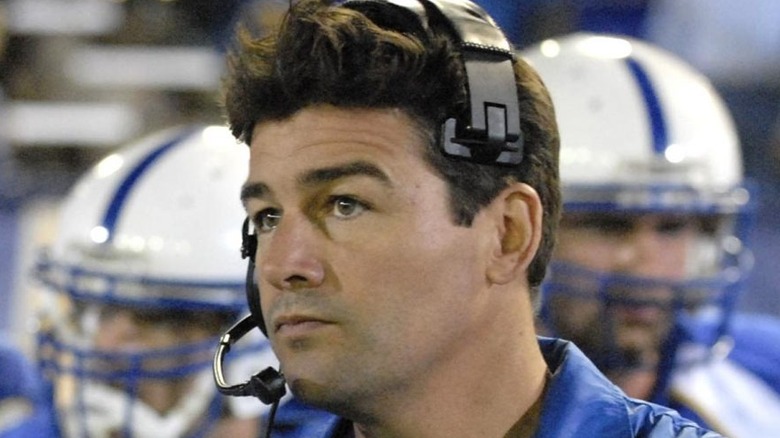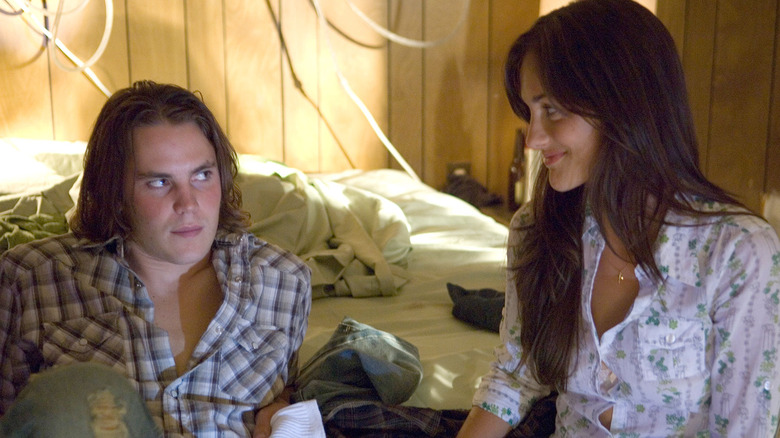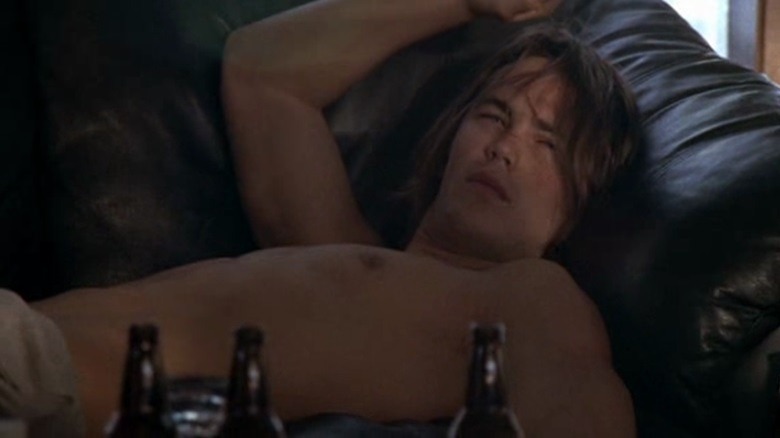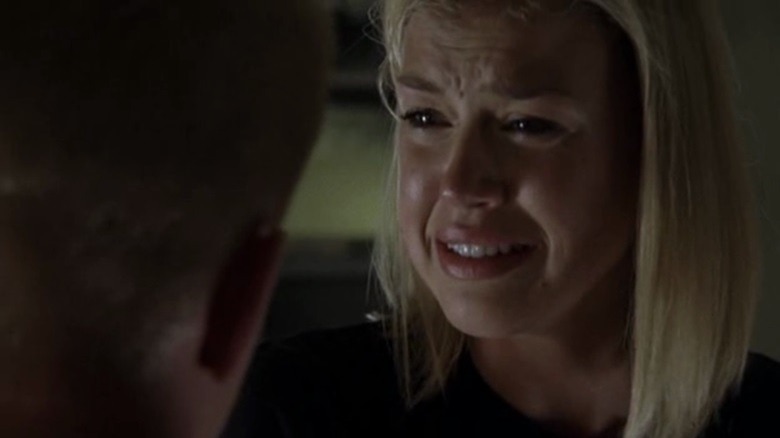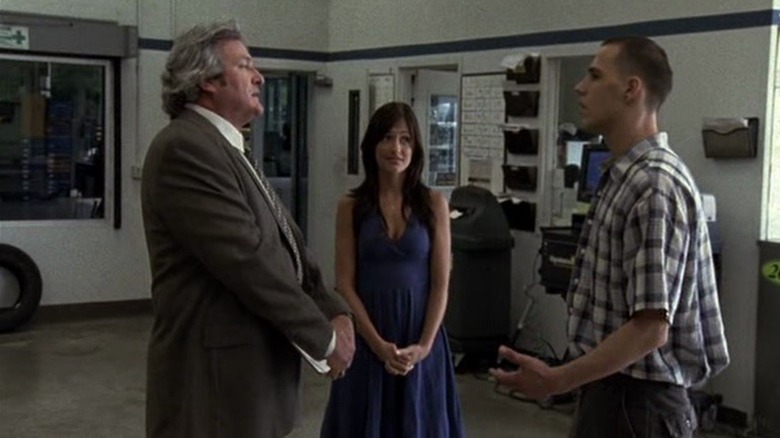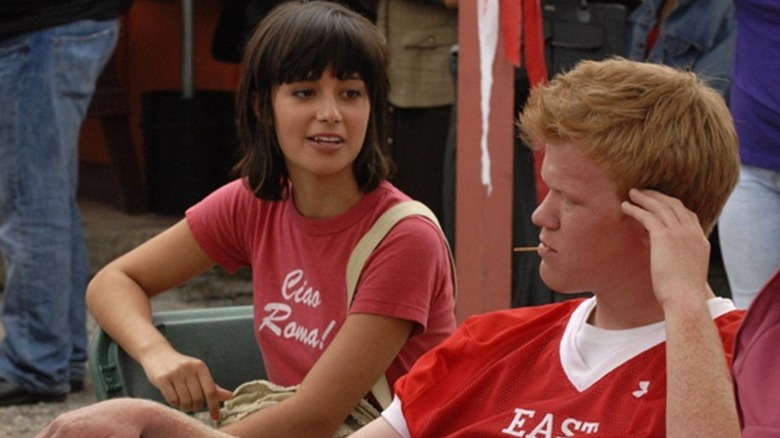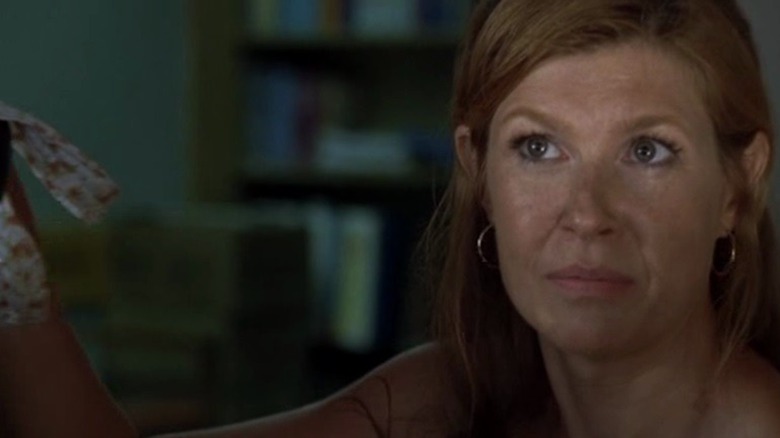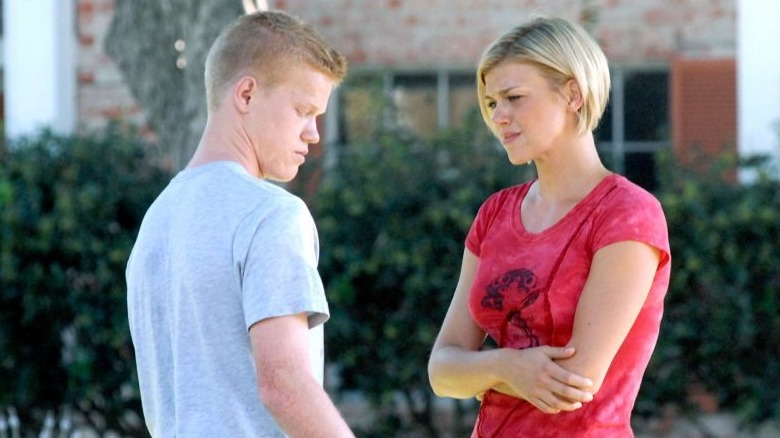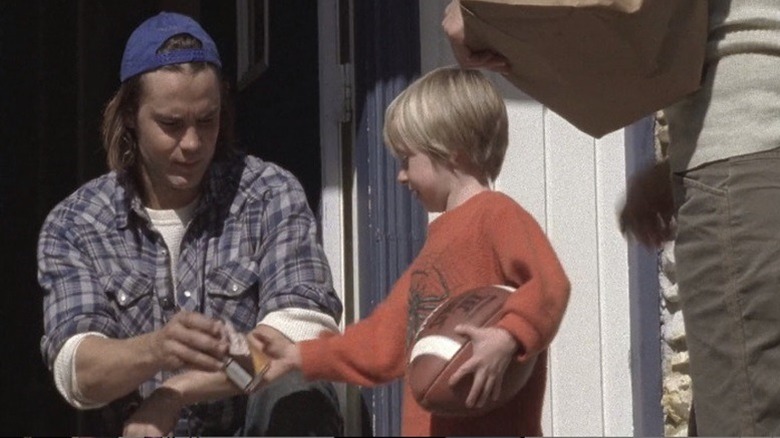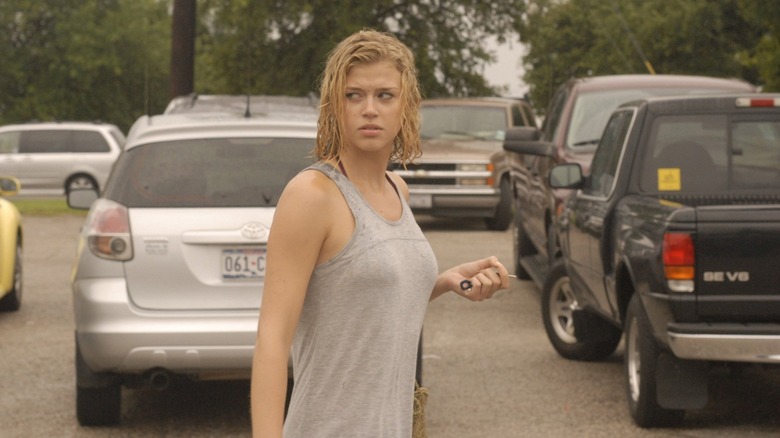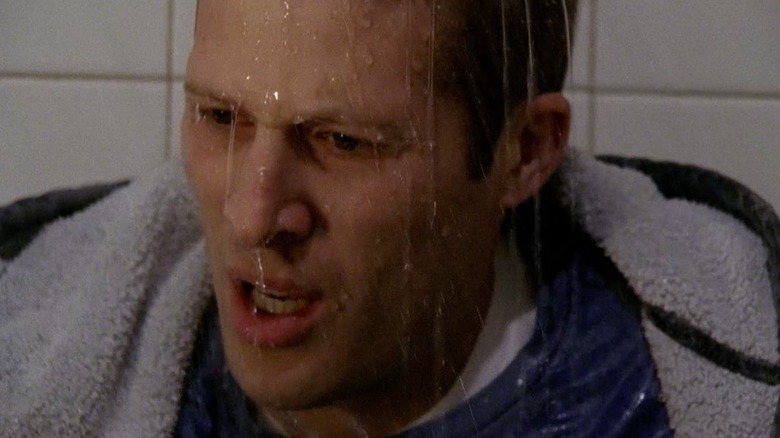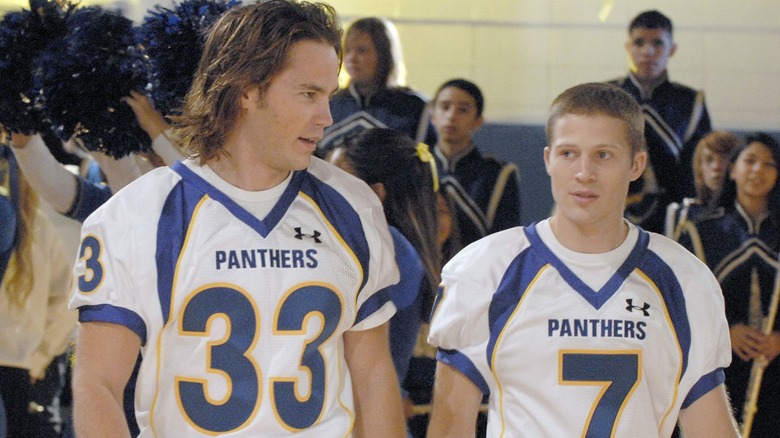Things Only Adults Notice In Friday Night Lights
"Friday Night Lights" is a champion among television sports dramas. The series ran on NBC and DirecTV's own network for five years — between 2006 and 2011 — and was highly regarded by critics, despite suffering low ratings. The show even came close to being canceled while on the air — but later on, it lived up to what critics and fans saw in it and became a cult classic among audiences all over the world.
The drama is set in a fictional West Texas town called Dillon and revolves around a high school football team: the Dillon Panthers. One of the reasons the series became so popular over time is its small-town charm. "Friday Night Lights" perfectly captures the vibe of the American countryside, while not shying away from the difficulties people often face in that environment.
The series mostly follows the everyday life of players, teenagers, and young adults in the town and addresses profound issues in American culture. Traditional family values, racism, addiction, mental health, and the lack of economic opportunities are among the subjects it portrays with authenticity and empathy. This mature approach is what makes it an absolute triumph in the genre — and might also be the reason there are some things in "Friday Night Lights" only adults notice.
This article contains discussions of mental illness and sexual assault.
Most of the main actors weren't actually teenagers
At first glance, most of the main actors who play high school students in "Friday Night Lights" seem like teenagers, but they're not. This only becomes more and more obvious as the series moves forward.
Taylor Kitsch, who played the masculine ladies' man and the coolest football player, Tim Riggins, was actually 25 years old when the show began its run in 2006. Regardless of how clean-shaven he appeared on screen, no one could convince an adult that he was, according to the Season 1 timeline, only 17 years old (although his tough and mature look might explain why he could buy alcohol anywhere he went without getting carded). Zach Gilford, who played the shy, socially awkward, and introverted quarterback, Matt Saracen, is a slightly harder case to crack. Still, no matter how innocent and boyish he seems in Season 1, it's a pretty safe bet to say that he isn't 16 years old — because the actor was 24 when the show debuted.
Adrianne Palicki and Minka Kelly, who played students Tyra Collette and Lyla Garrity, are the most obvious examples. It's not to say that they don't come across as young in the 1st season, but they are also way out of everyone's league who goes to Dillon High School. Whether they put on a cheerleader outfit or jeans and T-shirts, an older audience could immediately tell that those two aren't high schoolers anymore. And this is true: Palicki was 23 and Kelly was 26 in the pilot episode.
The town of Dillon is Moby-Dick
In the pilot, the coach's daughter, Julie Taylor (Aimee Teegarden), brings up Herman Melville's epic novel, comparing it to Dillon while her dad watches football tapes at home. ""Moby-Dick" is actually the perfect metaphor for this town," she remarks. "The cold black sea is representing the season in all its uncertainties. The magical white whale is the Holy Grail — state championship. The whalers are the team, right?" Then her dad asks, "Who's that make me? Coach Ahab?"
Well, not exactly. Coach Taylor (Kyle Chandler) doesn't have an obsessive quest to take revenge on Dillon by using his players the way Captain Ahab strives to take revenge on Moby Dick at the expense of his crew. In fact, Taylor often makes sacrifices to help his team out: He isn't like Ahab in the slightest. But Julie is right about the big white whale and Dillon in one important way — she just doesn't know it yet.
"Moby-Dick" is the perfect metaphor because the titular whale affects every character individually throughout the story — and so does Dillon. As newcomers, the Taylor family changes a whole lot during its time in the tiny Texas town. Any outsider who spends time in this place will have a different experience, but one thing is for sure: This town has a huge influence on everyone who encounters it. And by the end of the series, we'll see how it changed all of our beloved characters — and we might even realize how watching them living there has changed us.
Tim Riggins' drinking habit
Part of the appeal of the show's most popular character is that he loves to have fun. In his world, that means two things: beer and women. For most of the 1st season, we barely see him outside the football field without a glass or bottle in his hands. It's not a good look — in fact, it's a bit worrying. Tim is clearly way beyond the level of social or celebratory drinking, which, especially for a high schooler, is far from healthy behavior.
What makes it worse is that wherever Riggins goes, people sell him alcohol without even questioning his age. In one Season 2 scene, he buys beer for his best friend, Jason Street (Scott Porter), after the latter was denied alcohol by the cashier — even though they're the same age. In another instance, he goes day-drinking with Saracen, and the bartender doesn't bat an eye when he orders two shots of whiskey along with a couple of beers.
Considering Riggins' drinking habit and behavior throughout the series, which included a lot of drunk driving, he's lucky he's still alive in the finale — and he's definitely not a good example for high school viewers.
If you or anyone you know is struggling with addiction issues, help is available. Visit the Substance Abuse and Mental Health Services Administration website or contact SAMHSA's National Helpline at 1-800-662-HELP (4357).
Tyra shows symptoms of PTSD after sexual assault
One of the most controversial storylines in the show begins at the end of Season 1. One night, as Tyra waits for Landry (Jesse Plemons) in a parking lot, a stranger sexually assaults her — although she manages to escape before the worst can happen. In the Season 2 premiere, the same man follows Tyra and attacks her again. This time, Landry shows up to prevent the crime. He confronts the attacker, who tries to flee. But out of anger, Landry picks up a pipe and hits him over the head. Tyra and Landry don't call the police — instead, they hide the body and later dump it in the river.
In the following episodes, Tyra shows symptoms of PTSD (Post-Traumatic Stress Disorder), including re-experiencing, flashbacks, emotional numbing, and guilt. These symptoms are common among people who experience sexual assault. Although the writers attempt to portray what Tyra feels in various scenes, this storyline gets buried without granting her the appropriate treatment such an emotional state requires.
The climax comes when Tyra is called into the police station to identify the body found in the river. She's distressed and anxious, and she confesses that the body belongs to the stranger who attacked her. Adrianne Palicki's performance is strong enough to make us feel everything she's going through ... But more mature viewers can't help thinking that such a traumatic event deserves a more profound discussion that addresses the mental repercussions.
If you or anyone you know has been a victim of sexual assault, help is available. Visit the Rape, Abuse & Incest National Network website or contact RAINN's National Helpline at 1-800-656-HOPE (4673).
Buddy Garrity's white savior complex
Buddy Garrity (Brad Leland) isn't the most subtle character in "Friday Night Lights." He's kind of a pusher. Whatever he does, he always has an agenda — which usually involves benefitting his exalted football team, the Dillon Panthers.
In Season 2, Buddy's daughter Lyla has been holding a grudge against him. So, when she tries to help out a Hispanic teen named Santiago (Benjamin Ciaramello), who just got out of juvenile detention and needs a job, Buddy tries to make amends by giving Santiago a job at his car dealership. Later on, he talks Santiago into a tryout for the Panthers. His intentions are crystal clear from the beginning — he's using this kid in ways that could benefit him: first, to settle his relationship with Lyla, and second, to support his favorite football team. Eventually, he even puts a roof over Santiago's head.
This story comes off as a bit of a white savior narrative, if a subtle one. Buddy sees himself as superior to Santiago and, no matter how good his intentions may be, views their relationship as something he can take advantage of to further his own ends. But as he gets to know the kid more, Buddy begins to actually like him. He genuinely wants to help the young man — even if adult viewers can't help but notice that his approach often feels condescending and patronizing.
We never know Riggins' actual age, but we're always sure he's not a teen
It's somewhat funny that we never learn Riggins' actual age during the show. It's only implied in ways that could benefit the plot (even if, as we discussed, it's painfully evident that he cannot be younger than 21). According to Michael Baumann, who attempted to do the math in a 2018 article for The Ringer, the writers intentionally (or at least carelessly) altered Riggins' age to support certain storylines. We can definitively state that it's inconsistent based on his relationships with other characters.
In Season 1, he's in the same year as Jason Street, a senior, but then he somehow sticks around for another two years at Dillon High School. Yet in Season 3, he's magically in the same year as Saracen. What the heck is going on? No one knows apart from the writers. Maybe Riggins is like Ryan Reynolds' character in "Van Wilder," who has no intention to graduate because he loves the community way too much.
The integration of LGBTQ characters
Although the social climate was somewhat different when the show first aired versus today, "Friday Night Lights" never shied away from integrating queer characters into its world. These characters never have a main storyline in the show, but they appear repeatedly throughout in an understated but organic way that older viewers especially can appreciate.
Mayor Lucy Rodell (Libby Villari) is the elected leader of Dillon and discreetly reveals to several characters that she's a semi-closeted lesbian. The most memorable of these moments is a dinner she hosts at her home for Coach Taylor and his wife. The two have no idea that she is a lesbian, so they're quite shocked to find out there and then. In another episode, Coach Stan (Russell DeGrazier), the assistant coach of the team, is seen in a gay bar by Julie. Later, she brings this up in a conversation, but Stan denies the encounter ever happened. Julie understands the sensitive situation perfectly and leaves it at that. Devin (Stephanie Hunt), a high school student, is another character who comes out to her friends as a lesbian. They accept her sexual orientation without judgment.
Each character deals with their identity differently, and each character's experience is authentically captured by the writers and portrayed with sympathy by the actors who play them.
Tami Taylor's postnatal depression
In Season 2, Tami Taylor (Connie Britton) gives birth to her second child, Gracie. At the time, her husband is far away training a college football team, while her daughter is busy dating a newcomer. Tami struggles to cope with the situation and develops symptoms that suggest she has postnatal depression.
According to the NHS, postnatal depression affects many women after they give birth. The symptoms vary, but the most common ones are feeling low, exhausted, agitated, and tearful in the first three weeks after having a baby.
In the second episode of Season 2, Tami is clearly overwhelmed. She makes questionable decisions like walking several miles to the school with Gracie in the blazing summer heat. She bursts into tears multiple times, showing that she's really not in a good place mentally and emotionally. Undeniably, Tami is one of the strongest female characters in the series. Yet, the writers showed us that even such a balanced and well-organized person can face difficulties sometimes — and that's totally okay. Tackling and emphasizing a serious mental health condition like this from the perspective of such a strong character only adds to the series' emotional depth.
If you or someone you know is struggling with mental health, please contact the Crisis Text Line by texting HOME to 741741, call the National Alliance on Mental Illness helpline at 1-800-950-NAMI (6264), or visit the National Institute of Mental Health website.
A poignant reference to Shel Silverstein's The Giving Tree
In Season 3, Landry addresses how Tyra exploits him because of his tender feelings toward her. He brings up Shel Silverstein's classic 1964 children's picture book to describe their relationship.
"Have you ever read the book "The Giving Tree"? It's about this tree who loves this boy more than anything, right? And the boy just takes and takes and takes until there's absolutely nothing left but a stump. And I'm like the tree, and you're the boy — just take and take and take, and there's absolutely nothing left, Tyra."
It's a pretty obvious reference, but it evokes interesting thoughts about boundaries that adult viewers are more likely to recognize. At this point in the story, Tyra and Landry aren't an item anymore, but they're still friends — and Landry continues to have feelings for her. Because of these feelings, he helps her study so she can get into a better college. The one-sidedness of this relationship escalates in this episode, begging the question of whether Tyra's behavior comes from selfishness or altruism. Is she using Landry, or is she trying to be nice to him?
It's an important lesson that many of us face when it comes to relationships. Thankfully, the writers don't try to lecture us about right or wrong. They simply raise a valid argument and let us draw our own conclusions.
Inappropriate relationships in Dillon
"Friday Night Lights" is one of the top contenders for the title of Most Inappropriate Relationships when it comes to teenagers on TV. There were some really bad ones throughout the five seasons, but younger viewers might not catch just how sketchy they are.
One of Tim Riggins' many cursed affairs is with his new neighbor, Jackie (Brooke Langton), in Season 1. She's a single mom — at least a decade older than Tim — who can't resist his charm and the appeal of how he treats her young son. Their fling enters even more questionable territory when Riggins becomes a father figure for the little boy. But what comes next could put any soap opera to shame: Jackie ends things with Tim and hooks up with his older brother, Billy. Who could blame Tim for moving out after all this goes down?
In Season 5, Julie is in college, feeling a little lost and isolated in her new life far from home. She gets close with her college teaching assistant, a married man. Eventually, the two start a brief affair, and Julie ends up getting humiliated by the assistant's wife. There's certainly a lesson here about how not to begin your college life. Considering these two catastrophic examples, Saracen's illicit romance with his grandmother's caregiver could have gone much worse (though it's still not healthy or appropriate, like many of the relationships on the show).
Tyra's stand against domestic violence
Throughout the series, Tyra experiences a lot of verbal and physical violence when it comes to men. In Season 1, she protects her mother from getting beaten up by her boyfriend. Soon after, the two go out and share an intimate conversation about what went down. Tyra's mom argues that people have fights. Tyra sagely responds, "People do have fights. But they don't have fights every day. And don't let men beat the hell out of them."
In this scene, Tyra takes a stand against domestic violence and forces her mother to choose between her and her boyfriend. It's one of the most courageous moments in the show. Despite adversity and suffering, Tyra consistently represents a fierce female character with a strong voice. Her taking a stand teaches us that no one should ever endure abuse in their lives regardless of the circumstances. It's a lesson older viewers are more likely to pick up on, and that they can then pass on to younger, more impressionable individuals in their lives.
If you or someone you know is dealing with domestic abuse, you can call the National Domestic Violence Hotline at 1−800−799−7233. You can also find more information, resources, and support at their website.
The neglect of Saracen's parents
Seasoned viewers will notice that Saracen's parents are among the most absent a young teen can have. His mother left him when he was little, and his father serves in the military. Understandably, he's detached from both of them. The only person he really considers family is his grandmother, who raised him.
Saracen faces tremendous responsibilities as the man of the house that shouldn't be his concern at all. He's still just a shy kid who's overwhelmed by school and being the starting quarterback for the Panthers. When his dad returns home for a brief period, Saracen desperately tries to connect, but his father refuses to let him get close. As a soldier, he's having a sort of identity crisis himself, feeling that he simply doesn't belong in the civilian world — so he takes off and leaves his boy again. Eventually, though, Saracen's mother finds her way back into his life. She tries her best to make him understand why she left in the first place; it's not enough, but it's a good start.
The weight of the world on Saracen's shoulders is undeniable throughout the show. It's no wonder why he finds a second father in his football coach, who looks after him more than his parents ever did. But none of that makes it any less painful that his folks neglected him when he would've needed them the most growing up.
Saracen and Riggins look good on the field because they know football
To someone who knows nothing about the sport, every player on the Panthers team might come off as someone who knows what they're doing. Most of the time, however, this isn't the case — it's good acting, not necessarily good football. But when it comes to actors Zach Gilford and Taylor Kitsch, their athletic ability is more than performance.
According to an interview with Deseret News, Kitsch played wide receiver before his acting career took off. "I was pretty skinny when I was younger," he revealed. "I played for just two seasons, but I played sports since I was, like, 3 years old, so the transition wasn't really too difficult." Ironically, Gilford played opposite sides of the line in real life and on the show. "I played, like, a year of defense, and then I snapped my leg," he recalled.
So, if older and more aware viewers suspected 2006 wasn't the first time these guys stepped foot on a football field, they were totally right. And the actors' background absolutely added to the authenticity of the series when it portrayed tough practices and intense matches.
Julie Taylor's literary awareness
The literary references in "Friday Night Lights" are few and far between, to say the least. But in Season 4, Julie brings up Truman Capote's short story, "A Christmas Memory," while she's being interviewed by a college admissions officer. She explains that she eventually read all of his short stories and discovered that he and Harper Lee (the author of "To Kill a Mockingbird") actually lived in the same small town.
She draws a parallel between their experiences of small towns and her own. "I was shaped by my town," she says. "I have a different viewpoint than every other person." Then she adds, "I thought that every book I read was like a rung on a ladder that I built to escape this town that was all about high school football and nothing else."
It's a touching observation and comparison, given how much Julie hated Dillon when her family moved there in the 1st season. Now, four years later, she realizes that she's grown to love this strange and rural place; she even refers to it as her own. Thus the places we live do fundamentally change us, after all — as Julie unwittingly alluded to when she compared Dillon to Moby-Dick years before.
